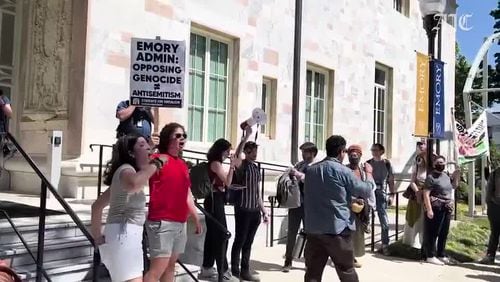Caroline Small has been dead nearly six years, but her tragic killing at the hands of Glynn County police loomed over the Capitol last week in a contentious debate that went to the heart of how such cases are handled.
Can local district attorneys fairly prosecute officers who they work with on a daily basis?
In a forceful display of unity, Georgia's district attorneys and law enforcement officials said yes as they successfully turned back a proposal to require appointment of special prosecutors in police shooting cases, and argued that existing law allows DAs to recuse themselves when they have a conflict.
But an Atlanta Journal-Constitution analysis of the Small case, in which questionable actions by Brunswick District Attorney Jackie Johnson helped the officers escape prosecution, shows the limits of prosecutorial safeguards.
Over the past six years, Johnson recused herself at least 16 times in cases where there was a possible conflict or appearance of a conflict in her office, but never in a police shooting case.
Last year, the AJC reported that Johnson had undisclosed conflicts of interest in the Small case: the local chief of police, who said from the outset that his officers were justified in shooting the unarmed mother, endorsed her quest to become district attorney while the DA's office was weighing criminal charges against the officers. The chief wrote to then-Gov. Sonny Perdue supporting Johnson's appointment as district attorney when her predecessor became a judge. Her appointment came within weeks of Small's shooting and and gave her a crucial advantage in the election later that year.
In the official program for her swearing-in, she thanked many in the local law enforcement and legal community who had been "especially helpful" to her, including the police chief and a lawyer who would later act as the defense attorney for one of the officers who killed Small.
Within days of assuming office, Johnson had fired the original prosecutor handling the case and taken charge of it herself.
Two former assistant DAs in Johnson’s office argued over the past week that special prosecutors would remove the opportunity for politics to influence the outcome in police shooting cases.
Georgia’s district attorneys and law enforcement officials countered that there is no inherent conflict when DAs handle cases involving the police, and said special prosecutors would cut out the voters’ right to hold local DAs accountable at the ballot box.
“We trust these prosecutors to make decisions every day regarding the prosecution of all other public officials,” testified Lance LoRusso, the general counsel to the Georgia Fraternal Order of Police. “When we talk about conflicts of interest, people look at them every day and they handle them.”
But critics held out the Small case as a prime example of how that doesn’t always happen.
David Peterson, who worked in Johnson's office at the time of the shooting and called it a murder, emailed lawmakers last week and recapped some of the facts revealed in the AJC's investigation.
Peterson noted how Johnson removed the original prosecutor assigned to the Small case after he’d stated publicly that he planned to seek an indictment against the officers. Johnson said his public statements damaged her ability to work with the police department.
“This fact alone, as a matter of proper prosecutorial ethics, required her to forward the case to the Attorney General,” he wrote. “She did not.”
Johnson’s record
The AJC’s review of Johnson’s record, however, shows she recognized conflicts or potential conflicts in other cases that appeared to have far less at stake than the killing of an unarmed woman by two police officers.
In the majority of the cases where she cited a reason, Johnson’s rationale for recusing herself was a personal or professional relationship with someone linked to her office, or with an office that she worked with.
One case involved an investigation of the son-in-law of one of her assistant DA’s. Another involved a stalking case that became an issue in her 2012 re-election campaign and she did not want the prosecution to appear political. Another involved theft and forgery allegations against a former employee of the Glynn County Superior Court Clerk’s office.
A fourth case involved a burglary victim who had a professional relationship with her office. The fifth involved a newly elected judge in her circuit.
“Many members of my staff, including myself, know her personally,” Johnson wrote in an October 2012 letter. “As such, I feel it best to recuse myself and my office from dealing with any criminal matters that result from the investigation” of the judge.
The AJC wanted to ask Johnson how her personal relationship with a judge, or a working relationship with another court office, was different than her relationship with the local police, as the basis for a decision to recuse herself.
But Johnson did not respond to an interview request for this story and has declined repeated requests dating back to last year to discuss her actions in the Small case. She has said her actions were appropriate and has said the local grand jury and a federal judge in a civil case both found the officers’ actions legal.
She has been criticized across Georgia and the nation for her actions in the Small case since an AJC/Channel 2 Action News investigation first appeared last July.
The investigation revealed the steps Johnson took that helped clear the officers, including presenting their attorneys with all the evidence nearly two months before the grand jury met in 2011 and allowing them to ask questions of witnesses inside the grand jury room — both highly unusual acts.
She also cut a deal with the officers not to present an indictment to the grand jurors unless they asked for one. And her relationship with Glynn County Chief of Police Matt Doering has come under scrutiny.
Small’s family and friends formed a Justice for Caroline Small group last summer to get authorities to re-examine the case. They have asked for an independent prosecutor be appointed to reopen the case. Last month, a sitting Glynn County grand juror asked Johnson to step aside. Thus far, she has declined.
DAs rely on police, expert says
Former DeKalb County District Attorney J. Tom Morgan said Johnson should let an independent prosecutor review the case. But there is no provision in Georgia law that requires her to do so, Morgan said. The circumstances fall into a gray area of conflict of interest rules where a prosecutor’s judgment is the ultimate guide, he said.
Morgan, now a law professor at Western Carolina University who has taught a course on police shootings and the justice system, said Johnson’s views about damaging the relationship with the police department should never factor into a DA’s decision.
“Even though she wasn’t legally required to, it probably would have been in her own best political interest to let an independent prosecutor,” he said. “And now with all the second-guessing going on, justice should be served. Politics should not get in the way.”
The ethics rules for prosecutors in Georgia and around the country aren’t equipped to address the built-in, structural conflicts that exist when prosecutors weigh charges against the police, particularly in high-stakes shooting cases, said Caren Myers Morrison, a former federal prosecutor who is a law professor at Georgia State University.
The two offices rely on each other closely to do their jobs and a camaraderie develops from working cooperatively on cases, she said. Those ties can even be closer in smaller communities where prosecutors and officers tend know each other personally, she said.
“If you anger the police they can make life very difficult for you,” Morrison said. “There’s a lot that local prosecutors need from the police and vice-versa. So having a broken down relationship between the police department and the prosecutor’s office would lead to the office coming to a standstill possibly.”
States seek alternatives
As police shootings have become a national issue in the past two years, many states are trying to figure out a process to evaluate shootings that is more open and engenders public confidence in the outcome. States are wrestling with ideas like special prosecutors or panels or other ways to bring independence in the decisions in the cases.
“They are all trying to figure out ways of making the process more fair,” she said. “What should happen legally, if anything, after a police officer kills somebody?”
Those who came to the Capitol last week to oppose the special prosecutor proposal said there is no reluctance on the part of DA’s to prosecute police.
“They prosecute officers everyday all over this state,” said Putnam County Sheriff Howard Sills, speaking on behalf of the Georgia Sheriff’s Association. “It just doesn’t bear out that they won’t do it in these cases.”
In fact, an AJC/Channel 2 analysis of fatal police shootings from 2010 through 2015 found that no officer has faced a criminal trial in more than 180 shootings.
About the Author








